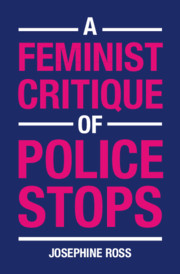Book contents
- Reviews
- A Feminist Critique of Police Stops
- A Feminist Critique of Police Stops
- Copyright page
- Dedication
- Epigraph
- Contents
- Acknowledgments
- Introduction
- Part I Bye, Bye Bill of Rights
- 1 Waive Your Rights: That’s How Stops and Frisks Were Meant to Work
- 2 The Most Dangerous Right: Walking Away from an Officer
- 3 Consenting to Searches: What We Can Learn from Feminist Critiques of Sexual Assault Laws
- 4 Punishing Disrespect: No Free Speech Allowed Here
- 5 Beyond Miranda’s Reach: How Stop-and-Frisk Undermines the Right to Silence
- Part II The Fallout
- Notes
- Index
3 - Consenting to Searches: What We Can Learn from Feminist Critiques of Sexual Assault Laws
from Part I - Bye, Bye Bill of Rights
Published online by Cambridge University Press: 08 December 2020
- Reviews
- A Feminist Critique of Police Stops
- A Feminist Critique of Police Stops
- Copyright page
- Dedication
- Epigraph
- Contents
- Acknowledgments
- Introduction
- Part I Bye, Bye Bill of Rights
- 1 Waive Your Rights: That’s How Stops and Frisks Were Meant to Work
- 2 The Most Dangerous Right: Walking Away from an Officer
- 3 Consenting to Searches: What We Can Learn from Feminist Critiques of Sexual Assault Laws
- 4 Punishing Disrespect: No Free Speech Allowed Here
- 5 Beyond Miranda’s Reach: How Stop-and-Frisk Undermines the Right to Silence
- Part II The Fallout
- Notes
- Index
Summary
The Supreme Court excuses a range of unwelcome searches, even strip searches, because the victim did not resist. Feminist critiques of rape law shed a bright spotlight onto the deficiencies in the Court’s analysis of consent to search. In 2018, New York State recognized that any sex with an on-duty officer is inherently coercive. Under the new law, police officers can’t argue consent when they’re accused of on-duty rape. Eliminating the consent defense for sex recognizes that police hold all the cards. That’s an excellent step, but then why should the law allow that officer to claim that the civilian consented to a search of her body or purse? The situations involve the same unfair power differential. In both situations, police have the power to let you go or charge you, what to charge and whether to be rough or gentle. Ultimately, civilians submit to police because it’s the safest thing to do. Consent within the Fourth Amendment suffers from the same legal myopia as consent within rape law. In both instances, courts often blame the victim for their fate as a way to support dominance by the group that holds power.
- Type
- Chapter
- Information
- A Feminist Critique of Police Stops , pp. 56 - 77Publisher: Cambridge University PressPrint publication year: 2020

